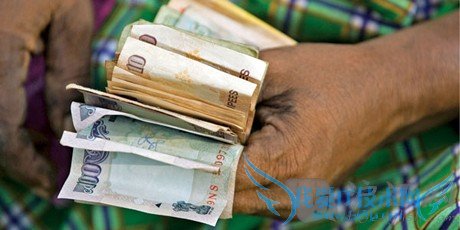��ӭ������52ijӢ��������������С��Ϊ�������Ӣ��֪ʶ�ǣ���������һ���š���˰������������ϸ�ķ�����
������һ���š���˰

As Rama Murthy completes the sale of his apartment in the Indian city of Hyderabad, he accepts from the buyer a bag full of rupees��part of the purchase price the tax man will never see. ��Almost 40 percent of the sale price I got in hard cash,�� says Murthy, 39, who works at a software company. ��It��s illegal, but it��s rampant in India to avoid paying tax.����Rama Murthy���������Hyderabad�ķ������������������õ�һ��Ǯ�����ⲿ��Ǯ��˰�˽���Զ��������Murthy��һ��������˾�Ĺ�Ա����˵���Ľ�������40%��ֱ���ֽ�֧���ģ����ǷǷ��ģ���������ӡ�Ⱥ����С�
India loses 14 trillion rupees ($314 billion) from tax evasion annually, depriving it of funds for investment in roads, ports, and power, says Arun Kumar, author of The Black Economy in India. General government tax revenue is an estimated 18 percent of India��s $1.5 trillion in gross domestic product, the lowest among the four BRIC nations, International Monetary Fund data show. With so little revenue coming in, Prime Minister Manmohan Singh is now attempting India��s biggest overhaul of the tax code in half a century.ӡ�Ⱥ�ɫ���õ�����Arun Kumar˵ӡ��ÿ����14�����ۺ���Ԫ3140����˰���Щ��˰�ֻ�ܴӵ�·���ۿں���Դ�ȵȷ���۳���IMF��������ʾӡ�ȵ�������������ֻ��1.5����GDP��18%���ǽ�ש�Ĺ������ֵ������ô�͵�˰���£�ӡ�ȵ�����MAnmohan Singh����ӡ�Ƚ���һ������˰���ƶȸĸ���ǰ����������ĵ�һ�Ρ�
Investors say tax reform would boost their confidence. ��If the government does end up making a substantial amount in revenue as a result of the tax overhaul, their deficit requirements should come down and the interest burden will also come down,�� says Killol Pandya, Mumbai-based head of fixed income investments at Daiwa Asset Management (India).Ͷ��������˰�Ƹĸ��Ȼ���������ǵ����ġ����������Ͷ�ʻ���Daiwa Asset Management��Killol Pandya˵���������Ŀ��Խ�����˰��ʢ�в���ĴӸĸ��л��һЩ����Ļ�����ô���ij��ֽ��ή��������ͬʱ������������Ҳ�ή��������
As finance minister in 1991, Singh accelerated tax cuts and reduced the bureaucracy that many businesses found so suffocating. Thanks to his efforts, the top individual income tax rate is now 30 percent, down from 97.5 percent in 1971. With his Direct Taxes Code legislation, Singh hopes to cut the corporate rate to 30 percent from 33 percent.��Singh1991�굣�β��������ڼ䣬������������˰�Ƹĸ�������úܶ���ҵͷ�۵Ĺ������塣������Ϊ����Ŭ����ӡ�ȸ�������˵��1971�����97.5%�����˵������ڵ����30%��������Ƴ���ֱ����˰�ƣ���ϣ��������ҵ��˰�ʣ���33%���͵�30%��
The new law, if passed, would also phase out tax holiday periods, which many companies exploit. For years, the north Indian state of Uttarakhand, for example, has had a tax holiday for manufacturers. Companies from elsewhere in India have booked their profits in Uttarakhand-based subsidiaries to lower their tax liability, says Kavita Rao, an economist in New Delhi at the National Institute of Public Finance and Policy. ��When you give these kinds of tax incentives there is always the possibility for misuse,�� says Sunil Gupta, a Finance Ministry official who helped write the legislation. Gupta estimates India loses as much as 800 billion rupees a year because of corporate tax incentives.����µķ����ܹ�ͨ������ôҲ������ȡ���ֽ�������ҵ��ʹ�õ���˰�ڱ�ɷֽ�ʵʩ�����ߡ�����������ӡ�ȱ�����ʡ��Uttarakhandһֱ����һ����˰���ڸ�������ҵ������ӡ�ȹ��ҹ������������ߵľ���ѧ��KAcita Rao˵�ܶ���ҵ����Uttarakhand���Լ��ķֲ�����ʵ������ķֲ�����Щ��ҵ��Ǯ�ĵط�����Ϊ��˰���͡�����������һλ���ڴ�Sunii��ʾ����������Ǹ��ط�������˰�ʴ̼������ǻᵼ�����á���Sunnii����ӡ��ÿ�����Ϊ����˰���Ż���ʧ8000��¬�ȡ�
These reforms will need extra enforcement. ��People have to believe that if they don��t pay taxes they will get caught,�� says Rao, who will lead one of three studies commissioned by the government of the black market economy. There��s already a proposal to boost the number of tax collectors, and a group has been set up to track untaxed transactions in the underground economy.��Ȼ����Щ�ĸ�Ҳ��Ҫ�ж���ı�����ʩ�������쵼ӡ����������Ժ��о��õ���������ίԱ��֮һ��Rao˵�����DZ���Ҫ���������������˰��Ȼ�ᱻץ���������ίԱ�������Ŀ�ľ���Ϊ������Щ��˰�����ܽ��ס�
One challenge is the paralysis that��s afflicted Parliament since this year��s scandal over irregularities in the sale of valuable mobile-phone licenses. ��The government must start the reform process once again,�� says Adi Godrej, chairman of Godrej Consumer Products, a maker of household and consumer products. Another reason for lawmakers�� reluctance is that part of India��s unreported cash bankrolls election campaigns, says N. Bhaskara Rao, chairman of the Center for Media Studies in New Delhi. ��Political parties will only be curtailing their spending power by backing proposals to curb black money,�� he says.���ǵ�����Ϊֹ����һ����ս��Ҫ�˷��������Ѿ����ڽ���Ĺ���Υ�����۵�����ҵӪ�����յij��Ŷ�ɥʧ�����˹����������Ը����ݺͿ���Ʒ������Godrej����ϯAdi Godrej��ʾ���ĸ�������¿�ʼ�ˡ������µ�������ý���о�����N. Bhaskara Rao˵����һ���������ٳٲ����ж���ԭ�����ӡ��������ѡս��Ҳ��һЩ˵������Դ���ֽ�������˵����Щ���Ͳ�����ð�������Լ�������Σ����֧�������Ȼ�ᵼ�����ǵĺ�Ǯ��ʹ�õ����
- �����б����������۽������ѱ�����˿���������������վͬ����۵��֤ʵ��������
-
